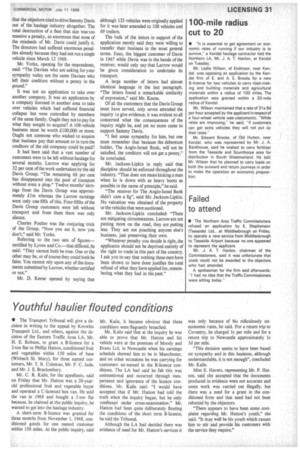Youthful haulier flouted conditions
Page 33

If you've noticed an error in this article please click here to report it so we can fix it.
• The Transport Tribunal will give a decision in writing to the appeal by Knowles Transport Ltd., and others, against the decision of the Eastern Traffic Area LA, Mr. H. E. Robson, to grant a B-licence for a 3-ton flat to Phillip Hatton, conditioned fruit and vegetables within 150 miles of base (Wisbech St. Mary), for three named customers, Mr. T. R. Coleman, Mr. F. C. Jude, and Mr. J. E. Brackenbury.
Mr. C. R. Kaile, for the appellants, said on Friday that Mr. Hatton was a 20-yearold professional fruit and vegetable buyer and operated a C-licensed box van. He sold the van in 1968 and bought a 3-ton flat because, he claimed at the public inquiry, he wanted to get into the haulage industry.
A short-term B-licence was granted for three months from November 1. 1968. conditioned goods for one named customer within 150 miles. At the public inquiry, said Mr. Kaile, it became obvious that these conditions were flagrantly breached.
Mr. Kaile said that at the inquiry he was able to prove that Mr. Hatton and his vehicle were at the premises of Moody and Evans Ltd. in Newcastle when his earnings schedule showed him to he in Manchester, and on other occasions he was carrying for customers un-named in the B licence conditions. The LA had said he felt this was unintentional and occurred through inexperience and ignorance of the licence conditions. Mr. Kaile said: "I would have accepted that if Mr. Hatton had told the truth when the inquiry began, but he only confessed under cross-examination." Mr. Hatton had been quite deliberately flouting the conditions of the short term B-licence. he told the Tribunal.
Although the LA had decided there was evidence of need for Mr. Hatton's services it was only because of his ridiculously uneconomic rates, he said. For a return trip to Coventry, he charged ls per mile and for a return trip to Newcastle approximately Is 3d per mile.
"This decision seems to have been based on sympathy and in this business, although understandable, it is not enough", concluded Mr. Kaile.
Miss E. Havers. representing Mr. P. Hatton, said she accepted that the documents produced in evidence were not accurate and some work was carried out illegally, but there was a need for a grant in the conditioned form and that need had not been rebutted by the objectors.
"There appears to have been some complaint regarding Mr. Hatton's youth," she said. "It may well be his youth which causes him to stir and provide his customers with the service they require."












































































































